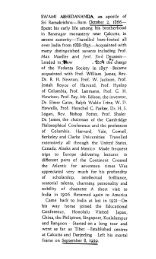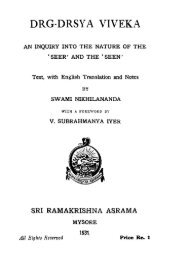<strong>Practical</strong> <strong>Vedanta</strong>obstacles. A plant grows. Do you make the plant grow? Your duty is to put ahedge round it and see that no animal eats up the plant, and there your duty ends.The plant grows of itself. So it is in regard to the spiritual growth of every man.None can teach you; none can make a spiritual man of you. You have to teachyourself; your growth must come from inside.What can an external teacher do? He can remove the obstructions a little, andthere his duty ends. Therefore help, if you can; but do not destroy. Give up allideas that you can make men spiritual. It is impossible. There is no other teacher toyou than your own soul. Recognise this. What comes of it? In society we see somany different natures. There are thousands and thousands of varieties of mindsand inclinations. A thorough generalisation of them is impossible, but for ourpractical purpose it is sufficient to have them characterised into four classes. First,there is the active man, the worker; he wants to work, and there is tremendousenergy in his muscles and his nerves. His aim is to work — to build hospitals, docharitable deeds, make streets, to plan and to organise. Then there is the emotionalman who loves the sublime and the beautiful to an excessive degree. He loves tothink of the beautiful, to enjoy the aesthetic side of nature, and adore Love and theGod of Love. He loves with his whole heart the great souls of all times, theprophets of religions, and the Incarnations of God on earth; he does not carewhether reason can or cannot prove that Christ or Buddha existed; he does notcare for the exact date when the Sermon on the Mount was preached, or for theexact moment of Krishna's birth; what he cares for is their personalities, theirlovable figures. Such is his ideal. This is the nature of the lover, the emotionalman. Then, there is the mystic whose mind wants to analyse its own self, tounderstand the workings of the human mind, what the forces are that are workinginside, and how to know, manipulate, and obtain control over them. This is themystical mind. Then, there is the philosopher who wants to weigh everything anduse his intellect even beyond the possibilities of all human philosophy.Now a religion, to satisfy the largest proportion of mankind, must be able tosupply food for all these various types of minds; and where this capability iswanting, the existing sects all become one-sided. Suppose you go to a sect whichpreaches love and emotion. They sing and weep, and preach love. But as soon asyou say, "My friend, that is all right, but I want something stronger than this — alittle reason and philosophy; I want to understand things step by step and morerationally", they say, "Get out"; and they not only ask you to get out but wouldsend you to the other place, if they could. The result is that that sect can only helppeople of an emotional turn of mind. They not only do not help others, but try todestroy them; and the most wicked part of the whole thing is that they will notonly not help others, but do not believe in their sincerity. Again, there arephilosophers who talk of the wisdom of India and the East and use bigpsychological terms, fifty syllables long, but if an ordinary man like me goes tothem and says, "Can you tell me anything to make me spiritual?", the first thingthey would do would be to smile and say, "Oh, you are too far below us in yourfile:///C|/Documents%20and%20Settings/Chitra%20Selva...oksBySwami/<strong>Practical</strong><strong>Vedanta</strong>/<strong>Practical</strong><strong>Vedanta</strong>PDF.html (56 of 113)2/26/2007 12:24:33 AM
<strong>Practical</strong> <strong>Vedanta</strong>reason. What can you understand about spirituality?" These are high-upphilosophers. They simply show you the door. Then there are the mystical sectswho speak all sorts of things about different planes of existence, different states ofmind, and what the power of the mind can do, and so on; and if you are anordinary man and say, "Show me anything good that I can do; I am not muchgiven to speculation; can you give me anything that will suit me?", they will smileand say, "Listen to that fool; he knows nothing, his existence is for nothing." Andthis is going on everywhere in the world. I would like to get extreme exponents ofall these different sects, and shut them up in a room, and photograph theirbeautiful derisive smiles!This is the existing condition of religion, the existing condition of things. What Iwant to propagate is a religion that will be equally acceptable to all minds; it mustbe equally philosophic, equally emotional, equally mystic, and equally conduciveto action. If professors from the colleges come, scientific men and physicists, theywill court reason. Let them have it as much as they want. There will be a pointbeyond which they will think they cannot go, without breaking with reason. Theywill say, "These ideas of God and salvation are superstitious, guise them up! " Isay, "Mr. Philosopher, this body of yours is a bigger superstition. Give it up, don'tgo home to dinner or to your philosophic chair. Give up the body, and if youcannot, cry quarter and sit down." For religion must be able to show how to realisethe philosophy that teaches us that this world is one, that there is but one Existencein the universe. Similarly, if the mystic comes, we must welcome him, be ready togive him the science of mental analysis, and practically demonstrate it before him.And if emotional people come, we must sit, laugh, and weep with them in thename of the Lord; we must "drink the cup of love and become mad". If theenergetic worker comes, we must work with him, with all the energy that we have.And this combination will be the ideal of the nearest approach to a universalreligion. Would to God that all men were so constituted that in their minds allthese elements of philosophy, mysticism, emotion, and of work were equallypresent in full! That is the ideal, my ideal of a perfect man. Everyone who hasonly one or two of these elements of character, I consider "one-sided''; and thisworld is almost full of such "one-sided" men, with knowledge of that one roadonly in which they move; and anything else is dangerous and horrible to them. Tobecome harmoniously balanced in all these four directions is my ideal of religion.And this religion is attained by what we, in India, call Yoga — union. To theworker, it is union between men and the whole of humanity; to the mystic,between his lower and Higher Self; to the lover, union between himself and theGod of Love; and to the philosopher; it is the union of all existence. This is whatis meant by Yoga. This is a Sanskrit term, and these four divisions of Yoga havein Sanskrit different names. The man who seeks after this kind of union is called aYogi. The worker is called the Karma-Yogi. He who seeks the union through loveis called the Bhakti-Yogi. He who seeks it through mysticism is called the Râja-Yogi. And he who seeks it through philosophy is called the Jnâna-Yogi So thisfile:///C|/Documents%20and%20Settings/Chitra%20Selva...oksBySwami/<strong>Practical</strong><strong>Vedanta</strong>/<strong>Practical</strong><strong>Vedanta</strong>PDF.html (57 of 113)2/26/2007 12:24:33 AM
- Page 1 and 2:
Practical VedantaPractical VedantaP
- Page 3 and 4:
Practical Vedantaworld. If I am a s
- Page 5 and 6: Practical Vedantadifference is only
- Page 7 and 8: Practical VedantaThe ideal of faith
- Page 9 and 10: Practical Vedantamoment of our live
- Page 11 and 12: Practical Vedantaof the Christs and
- Page 13 and 14: Practical Vedanta"This life is Brah
- Page 15 and 16: Practical Vedantadark fifteen days,
- Page 17 and 18: Practical Vedantalife. This is the
- Page 19 and 20: Practical Vedantaeverything would b
- Page 21 and 22: Practical Vedantait is only through
- Page 23 and 24: Practical Vedantawhich is that subt
- Page 25 and 26: Practical Vedantanoumenon and pheno
- Page 27 and 28: Practical Vedantato which is the be
- Page 29 and 30: Practical VedantaAbsolute.The finit
- Page 31 and 32: Practical Vedantawhich is not the q
- Page 33 and 34: Practical Vedantaexperience that th
- Page 35 and 36: Practical Vedantafulfilled. The Jiv
- Page 37 and 38: Practical Vedantabetween the pure r
- Page 39 and 40: Practical Vedantacome out straight.
- Page 41 and 42: Practical Vedantawar with one anoth
- Page 43 and 44: Practical Vedantanobody could under
- Page 45 and 46: Practical VedantaMy idea, therefore
- Page 47 and 48: Practical Vedantathe same methods.
- Page 49 and 50: Practical Vedantavarious minds, all
- Page 51 and 52: Practical Vedantabrotherhood; but t
- Page 53 and 54: Practical Vedantabrotherhood, but w
- Page 55: Practical Vedantawe all go with ves
- Page 59 and 60: Practical Vedantabeen preached in t
- Page 61 and 62: Practical Vedantathe husband kisses
- Page 63 and 64: Practical Vedantaof the knowledge a
- Page 65 and 66: Practical Vedantafor those who only
- Page 67 and 68: Practical Vedantasun exists because
- Page 69 and 70: Practical Vedantaof death was pleas
- Page 71 and 72: Practical VedantaGod. We must learn
- Page 73 and 74: Practical Vedantaa plague comes, it
- Page 75 and 76: Practical VedantaAtman? "As with a
- Page 77 and 78: Practical Vedantathat immortal One,
- Page 79 and 80: Practical Vedantaand the third egoi
- Page 81 and 82: Practical VedantaWitness of the uni
- Page 83 and 84: Practical VedantaPractical Vedanta1
- Page 85 and 86: Practical Vedantaeternal ; every ot
- Page 87 and 88: Practical Vedantafaculty, Buddhi, w
- Page 89 and 90: Practical VedantaPractical Vedanta1
- Page 91 and 92: Practical Vedantastepping-stone to
- Page 93 and 94: Practical Vedantarecognition? Findi
- Page 95 and 96: Practical Vedantasentient." This is
- Page 97 and 98: Practical Vedantaessentially differ
- Page 99 and 100: Practical Vedantaexistence is limit
- Page 101 and 102: Practical Vedantalive, for I am lif
- Page 103 and 104: Practical Vedantasee from Kapila's
- Page 105 and 106: Practical Vedantalimitation, but th
- Page 107 and 108:
Practical Vedantaperfect, infinite,
- Page 109 and 110:
Practical Vedantaindividuality, of
- Page 111 and 112:
Practical Vedantarepeat [something]
- Page 113:
Practical Vedantaperson who dies in
















